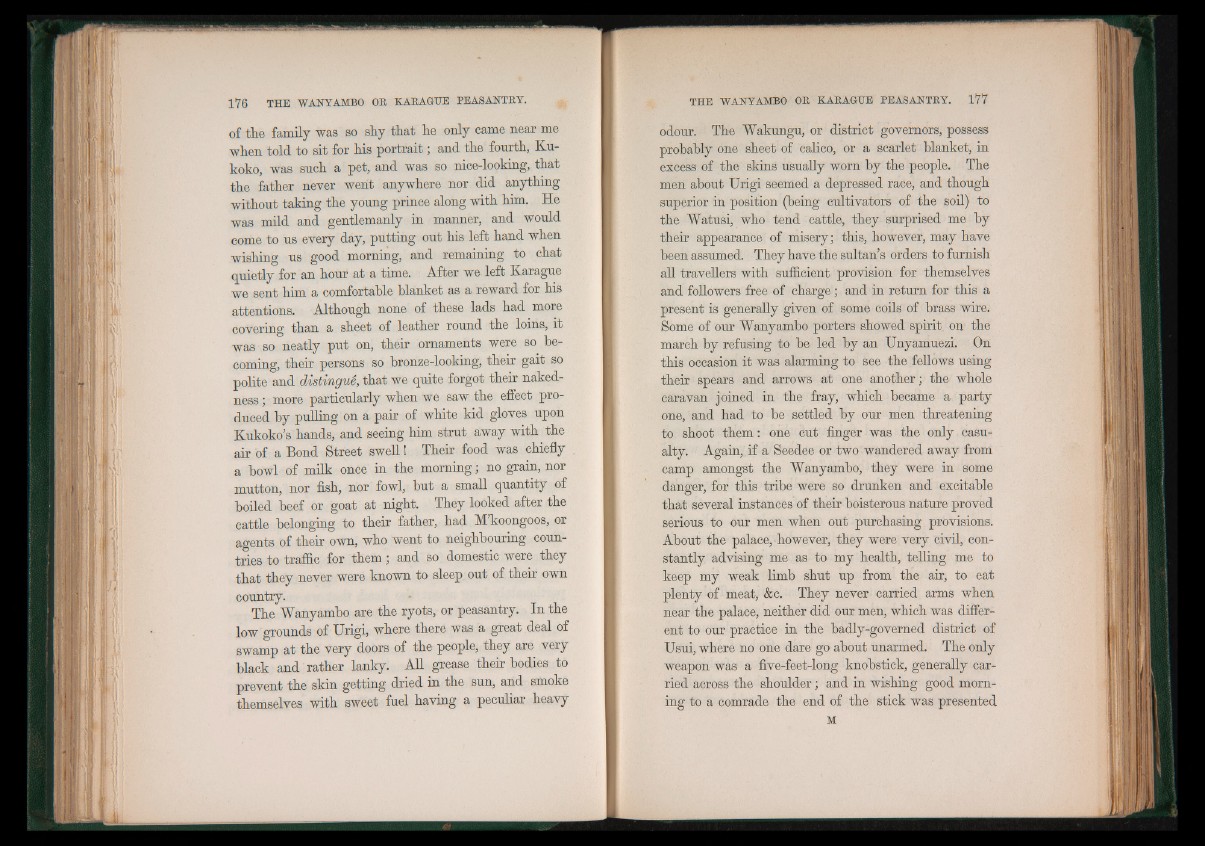
176 THE WANYAMBO OR KARAGUE PEASANTRY.
of the family was so shy that he only came near me
when told to sit for his portrait ; and the fourth, Ku-
koko, was such a pet, and was so nice-looking, that
the father never went anywhere nor did anything
without taking the young prince along with him. He
was mild and gentlemanly in manner, and would
come to us every day, putting out his left hand when
wishing us good morning, and remaining to chat
quietly for an hour at a time. After we left Karague
we sent him a comfortable blanket as a reward for his
attentions. Although none of these lads had more
covering than a sheet of leather round the loins, it
was so neatly put on, their ornaments were so becoming,
their persons so bronze-looking, their gait so
polite and distingué, that we quite forgot their nakedness
; more particularly when we saw the effect produced
by pulling on a pair of white kid gloves upon
Kukoko’s hands, and seeing him strut away with the
air of a Bond Street swell ! Their food was chiefly
a bowl of milk once in the morning ; no grain, nor
mutton, nor fish, nor fowl, but a small quantity of
boiled beef or goat at night. They looked after the
cattle belonging to their father, had M’koongoos, or
agents of their own, who went to neighbouring countries
to traffic for them ; and so domestic were they
that they never were known to sleep out of their own
country.
The Wanyambo are the ryots, or peasantry. In the
low grounds of Urigi, where there was a great deal of
swamp at the very doors of the people, they are very
black and rather lanky. All grease their bodies to
prevent the skin getting dried in the sun, and smoke
themselves with sweet fuel having a peculiar heavy
THE WANYAMBO OR KARAGUE PEASANTRY. 177
odour. The Wakungu, or district governors, possess
probably one sheet of calico, or a scarlet blanket, in
excess of the skins usually worn by the people. The
men about Urigi seemed a depressed race, and though
superior in position (being cultivators of the soil) to
the Watusi, who tend cattle, they surprised me by
their appearance of misery; this, however, may have
been assumed. They have the sultan’s orders to furnish
all travellers with sufficient provision for themselves
and followers free of charge; and in return for this a
present is generally given of some coils of brass wire.
Some of our Wanyambo porters showed spirit on the
march by refusing to be led by an Unyamuezi. On
this occasion it was alarming to see the fellows using
their spears and arrows at one another; the whole
caravan joined in the fray, which became a party
one, and had to be settled by our men threatening
to shoot them: one cut finger was the only casualty.
Again, if a Seedee or two wandered away from
camp amongst the Wanyambo, they were in some
danger, for this tribe were so drunken and excitable
that several instances of their boisterous nature proved
serious to our men when out purchasing provisions.
About the palace, however, they were very civil, constantly
advising me as to my health, telling me to
keep my weak limb shut up from the air, to eat
plenty of meat, &c. They never carried arms when
near the palace, neither did our men, which was different
to our practice in the badly-governed district of
Usui, where no one dare go about unarmed. The only
weapon was a five-feet-long knobstick, generally carried
across the shoulder; and in wishing good morning
to a comrade the end of the stick was presented
M